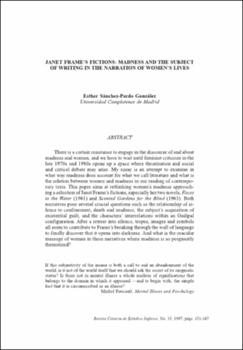Janet Frame's Fictions: Madness and the Subject of Writing in the Narration of Women's Lives
Date
1997Abstract
There is a certain resistance to engage in the discourse of and about
madness and woman, and we have to wait until feminist criticism in the
late 1970s and 1980s opens up a space where theorization and social
and critical debate may arise. My essay is an attempt to examine in
what way madness does account for what we call literature and what is
the relation between women and madness in our reading of contemporary
texts. This paper aims at rethinking women’s madness approaching
a selection of Janet Frame’s fictions, especially her two novels, Faces
in the Water (1961) and Scented Gardens for the Blind (1963). Both
narratives pose several crucial questions such as the relationship of silence
to confinement, death and madness, the subject’s acquisition of
existential guilt, and the characters’ interrelations within an Oedipal
configuration. After a retreat into silence, tropes, images and symbols
all seem to contribute to Frame’s breaking through the wall of language
to finally discover that it opens into darkness. And what is the oracular
message of woman in these narratives where madness is so poignantly
thematized?





